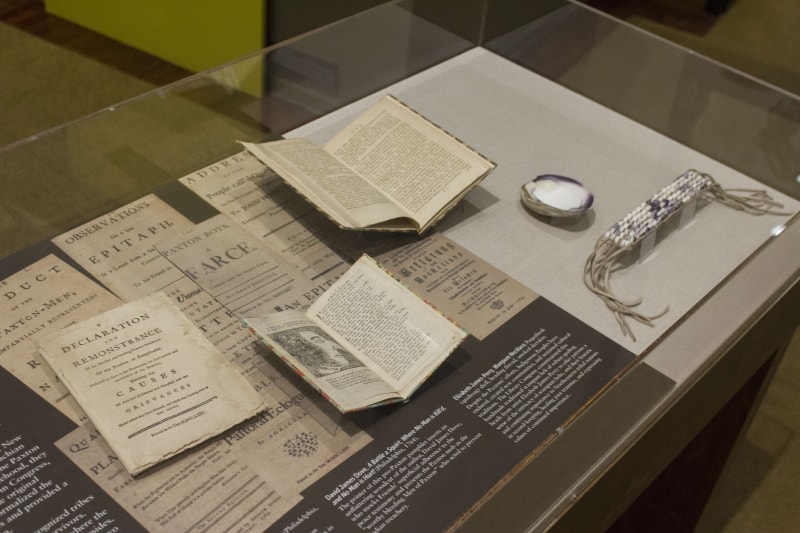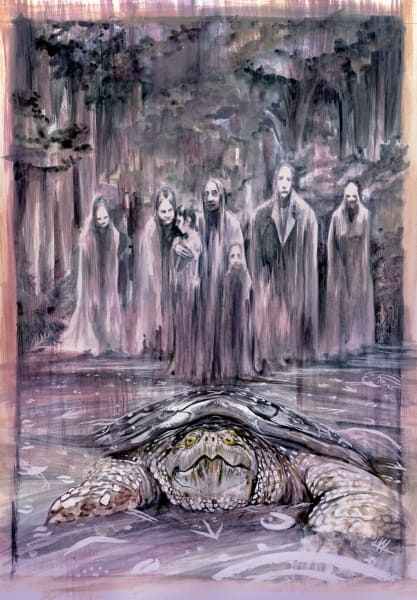Ghost River: News That’s Fit to Print
Ghost River is open through April 10, 2020
In November 2019, we marked the opening of the Ghost River: The Fall and Rise of the Conestoga, which will be up through April 10, 2020. In December, we have crossed yet another milestone: the publication of the Library Company of Philadelphia’s first graphic novel.
Ghost River: The Fall and Rise of the Conestoga isn’t just a powerful graphic novel, but also a rich educational resource. Alongside the luminous, hand-painted artwork, readers will find an introduction, artist statements, and contextual essays from leading scholars; an educational unit developed by the experts at the Gilder Lehrman Institute of American History; reproductions of the archival materials; and an annotated script, which opens up the creative and scholarly process behind the graphic novel.
We began distributing copies of Ghost River at our Annual Dinner (October 29, 2019), and we have continued to distribute copies at the Library Company. However, readers outside our learning community in Philadelphia have been left waiting for the printed volume. Fortunately, that changed this month.
On December 5, Red Planet Books & Comics began fulfilling preorders—and quite a few of them. At time of writing, they had exhausted our first print run, which is, no doubt, a good problem to have. Red Planet is slated to receive additional shipments in the next two weeks, which will position them to continue fulfilling orders before the end of the year.
In the meantime, I encourage interested readers to visit our exhibition, where we have first edition copies available for purchase ($25), or to visit our free, digital edition, which I’ll discuss at greater length in my next post.
Image from the cover of Ghost River: the Fall & Rise of the Conestoga by artist Weshoyot Alvitre.
- Adrian Gomez, ‘Horrific’ legacy: ‘Ghost River’ a ‘story of resilience’ of tribe after massacre, Albuquerque Journal, 10 January 2020.
- Weshoyot Alvitre and Lee Francis, Ghost River with Dr. Francis and Weshoyot, Nomadcast, 10 December 2019.
- John F. Ross, Redrawing History: A Graphic Novel Recounts the Conestoga Massacre from the Tribe’s Perspective, American Indian: The Magazine of the Smithsonian National Museum of the American Indian (Winter 2019: Vol. 20 No. 4), 4 December 2019.
- Weshoyot Alvitre and Lee Francis, Ghost River (Season 2, Episode 4), Talking in the Library, 1 December 2019.
- Will Fenton and Lee Francis, Telling a Native story from Native perspectives: Revisiting Pennsylvania’s Conestoga massacre, Philadelphia Inquirer, 28 November 2019.
- Chris Mautner, Over 250 years ago, a group of Pa. colonists murdered 20 Native Americans. Now there’s a graphic novel about it, PennLive, 21 November 2019.
- Jack Brubaker, New graphic novel depicts 1763 massacre from Indian perspective, Lancaster Online, 20 November 2019.
- Peter Crimmins, Native American comic artists tell story of 1763 massacre of Conestoga tribe in Lancaster, Pa., WHYY, 18 November 2019.
Happy New Year, indeed!
Redrawing History: Indigenous Perspectives on Colonial America has been supported by The Pew Center for Arts & Heritage.




